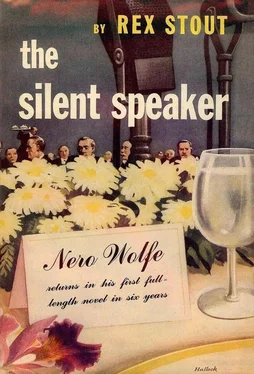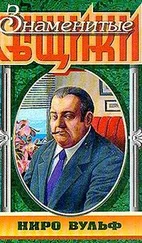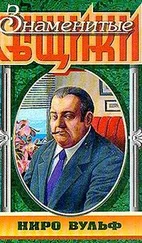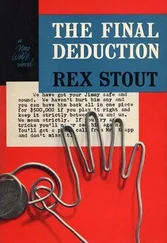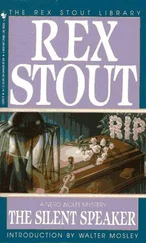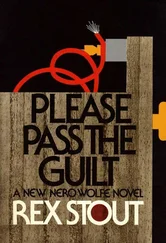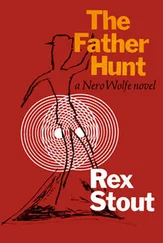“Bah.” Wolfe pointed to a picture of the Washington Monument, on the wall fifteen feet to his left. “Do you see that picture? It is actually a perforated panel. If Mr. Goodwin is sent from the room he will go to an alcove around a corner of the hall, across from the kitchen door, open the panel on that side, invisible to us, and watch us and listen to us. The objection to that is that he would be standing up. He might as well stay here sitting down.”
Without batting an eye, Smith stood up. “Then you and I will go to the hall.”
“No we won’t. — Archie. Mr. Smith wants his hat and coat.”
I arose and moved. When I was halfway across the room Smith sat down again. I whirled, returned to my base, and did likewise.
“Well, sir?” Wolfe demanded.
“We have somebody,” Smith said, in what was apparently the only tone he ever used, “for the Boone and Gunther murders.”
“We? Somebody?”
Smith untangled his fingers, raised a hand to scratch the side of his nose, dropped the hand, and retwined the fingers. “Of course,” he said, “death is always a tragedy. It causes grief and suffering and often hardship. That cannot be avoided. But in this case, the deaths of these two people, it has already caused widespread injury to many thousands of innocent persons and created a situation that amounts to gross injustice. As you know, as we all know, there are elements in this country that seek to undermine the very foundations of our society. Death is serving them — has served them well. The very backbone of our free democratic system — composed of our most public-spirited citizens, our outstanding businessmen who keep things going for us — is in great and real peril. The source of that peril was an event — now two events — which may have resulted either from the merest chance or from deep and calculated malice. From the standpoint of the common welfare those two events were in themselves unimportant. But overwhelmingly—”
“Excuse me.” Wolfe wiggled a finger at him. “I used to make speeches myself. The way I would put it, you’re talking about the nation-wide reaction against the National Industry Association on account of the murders. Is that correct?”
“Yes. I am emphasizing the contrast between the trivial character of the events in themselves and the enormous harm—”
“Please. You’ve made that point. Go on to the next one. But first tell me, do you represent the NIA?”
“No. I represent, actually, the founding fathers of this country. I represent the best and most fundamental interests of the American people. I—”
“All right. Your next point?”
Smith untwined his fingers again. This time it was the chin that needed scratching. When that was finished he proceeded, “The existing situation is intolerable. It is playing directly into the hands of the most dangerous and subversive groups and doctrines. No price would be too high to pay for ending it, and ending it at the earliest possible moment. The man who performed that service would deserve well of his country. He would earn the gratitude of his fellow citizens, and naturally, especially of those who are being made to suffer under this unjust odium.”
“In other words,” Wolfe suggested, “he ought to be paid something.”
“He would be paid something.”
“Then it’s too bad I’m already engaged. I like being paid.”
“There would be no conflict. The objectives are identical.”
Wolfe frowned. “You know, Mr. Smith,” he said admiringly, “I like the way you started this. You said it all, except certain details, in your first short sentence. Who are you and where do you come from?”
“That,” Smith declared, “is stupid. You’re not stupid. You can learn who I am, of course, if you want to take the time and trouble. But there are seven respectable — very respectable — men and women with whom I am playing bridge this evening. After a dinner party. Which accounts for the whole evening, from seven o’clock on.”
“That should cover it adequately. Eight against two.”
“Yes, it really should,” Smith agreed. He untangled his fingers once more, but not to scratch. He reached to his side coat pocket and pulled out a package wrapped neatly in white paper and fastened with Scotch tape. It was big enough to be tight in his pocket and he had to use both hands. “As you say,” he remarked, “there are certain details. The amount involved is three hundred thousand dollars. I have one-third of it here.”
I gave it a look and decided it couldn’t all be in hundreds. There must have been some five-hundreds and grands.
One of Wolfe’s brows went up. “Since you’re playing bridge this evening, and since you came here on the assumption that I’m a blackguard, isn’t that a little foolhardy? Mr. Goodwin, as I told you, is my confidential assistant. What if he took that away from you and put it in the safe and saw you to the sidewalk?”
For the first time the expression of Smith’s face changed, but the little crease that showed in his forehead didn’t look like apprehension. “Perhaps,” he said, and there was no change in his voice, “you’re stupid after all, though I doubt it. We know your record and your character. There isn’t the slightest assumption that you’re a blackguard. You are being given an opportunity to perform a service—”
“No,” Wolfe said positively. “We’ve had that.”
“Very well. But that’s the truth. If you ask why you’re being paid so large a sum to perform it, here are the reasons. First, everybody knows that you get exorbitant fees for everything you do. Second, from the standpoint of the people who are paying you, the rapidly accumulating public disfavor, which is totally undeserved, is costing them or will cost them, directly or indirectly, hundreds of millions. Three hundred thousand dollars is a mere nothing. Third, you will have expenses, and they may be large. Fourth, we are aware of the difficulties involved, and I tell you frankly that we know of no one except you who can reasonably be expected to solve them. There is no assumption whatever that you’re a blackguard. That remark was completely uncalled for.”
“Then perhaps I misunderstood the sentence you started with.” Wolfe’s eyes were straight at him. “Did you say you have somebody for the Boone and Gunther murders?”
“Yes.” Smith’s eyes were straight back at him.
“Who have you?”
“The word ‘have’ was a little inexact. It might have been better to say we have somebody to suggest.”
“Who?”
“Either Solomon Dexter or Alger Kates. We would prefer Dexter but Kates would do. We would be in a position to co-operate on certain aspects of the evidence. After your plans are made I’ll confer with you on that. The other two hundred thousand, by the way, would not be contingent on conviction. You couldn’t possibly guarantee that. Another third would be paid on indictment, and the last third on the opening day of the trial. The effect of indictment and trial would be sufficient, if not wholly satisfactory.”
“Are you a lawyer, Mr. Smith?”
“Yes.”
“Wouldn’t you pay more for Dexter than for Kates? You should. He’s the Acting Director of the Bureau of Price Regulation. It would be worth more to you.”
“No. We made the amount large, even exorbitant, to exclude any bargaining.” Smith tapped the package with his finger. “This is probably a record.”
“Good heavens, no.” Wolfe was mildly indignant, as if it had been intimated that his schooling had stopped at about the sixth grade. “There was Teapot Dome. I could rattle off eight, ten, a dozen instances. Alyattes of Lydia got the weight of ten panthers in gold. Richelieu paid D’Effiat a hundred thousand livres in one lump — the equivalent, at a minimum, of two million dollars today. No, Mr. Smith, don’t flatter yourself that you’re making a record. Considering what you’re bidding for, you’re a piker.”
Читать дальше
